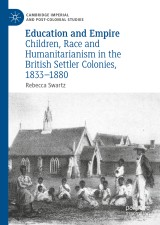Details

Education and Empire
Children, Race and Humanitarianism in the British Settler Colonies, 1833-1880Cambridge Imperial and Post-Colonial Studies
|
96,29 € |
|
| Verlag: | Palgrave Macmillan |
| Format: | |
| Veröffentl.: | 09.01.2019 |
| ISBN/EAN: | 9783319959092 |
| Sprache: | englisch |
Dieses eBook enthält ein Wasserzeichen.
Beschreibungen
<p>This book tracks the changes in government involvement in Indigneous children’s education over the nineteenth century, drawing on case studies from the Caribbean, Australia and South Africa. Schools were pivotal in the production and reproduction of racial difference in the colonies of settlement. Between 1833 and 1880, there were remarkable changes in thinking about education in Britain and the Empire with it increasingly seen as a government responsibility. At the same time, children’s needs came to be seen as different to those of their parents, and childhood was approached as a time to make interventions into Indigenous people’s lives. This period also saw shifts in thinking about race. Members of the public, researchers, missionaries and governments discussed the function of education, considering whether it could be used to further humanitarian or settler colonial aims. Underlying these questions were anxieties regarding the status of Indigenous people in newly colonisedterritories: the successful education of their children could show their potential for equality. </p>
<p>Chapter One: Introduction: Education and Empire: Children, Race and Humanitarianism in the British settler colonies.- Chapter Two: ‘The gift of education’: Emancipation and government education in the West Indies, Britain and beyond.- Chapter Three: Civilising spaces: Government, missionaries and land in education in Western Australia.- Chapter Four: ‘Forgotten and neglected’: Settlers, government and Africans’ education in Natal.- Chapter Five: A useful education: Humanitarianism, settler colonialism and industrial schools in Australia, New Zealand and South Africa.- Chapter Six: Researching education: Florence Nightingale, British imperialism and colonial schools.- Chapter Seven: Education and obligation: Compulsory schooling, childhood and the family.- Chapter Eight: Conclusion: The ‘chief blessing of civilisation, the benefit of education’.</p><br><p></p>
<p><b>Rebecca Swartz</b> is a Postdoctoral Research Fellow in History at the University of Stellenbosch, South Africa. She is an African Humanities Program research fellow, and held the Commonwealth Scholarship for her doctoral studies in the United Kingdom. She has published in the <i>Journal of Imperial and Commonwealth History, Journal of Colonialism and Colonial History, </i>and is co-editor, with Peter Kallaway, of <i>Empire and Education in Africa: The Shaping of a Comparative Perspective </i>(2016). </p>
<p>This book tracks the changes in government involvement in Indigneous children’s education over the nineteenth century, drawing on case studies from the Caribbean, Australia and South Africa. Schools were pivotal in the production and reproduction of racial difference in the colonies of settlement. Between 1833 and 1880, there were remarkable changes in thinking about education in Britain and the Empire with it increasingly seen as a government responsibility. At the same time, children’s needs came to be seen as different to those of their parents, and childhood was approached as a time to make interventions into Indigenous people’s lives. This period also saw shifts in thinking about race. Members of the public, researchers, missionaries and governments discussed the function of education, considering whether it could be used to further humanitarian or settler colonial aims. Underlying these questions were anxieties regarding the status of Indigenous people in newly colonisedterritories: the successful education of their children could show their potential for equality. </p>
Winner of the 2019 Society for the History of Childhood and Youth Grace Abbott Prize and the 2020 ISCHE First Book Award Compares histories of colonial education across multiple sites, including the Caribbean, New Zealand, Australia and South Africa Explores a wide spectrum of education, from broad imperial and governmental schemes, to local, intimate and emotional relationships between adults and children Considers various parties interested in education, including Indigenous people, families, settlers, governments, missionaries and researchers

















